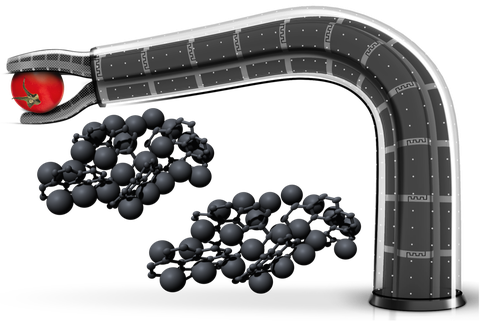Apr 11, 2022
IHM launches cooperation project with Leibnitz Institute for New Materials in Saarland as part of SPP2100 "Soft Material Robotic Systems"

Complex piezoresistive inks enable bio-inspired, multifunctional structures.
Accompanied by progress in the development of flexible electronic and mechatronic components, Soft (Material) Robotics has recently emerged as a new branch of robotics research that is seen as a possible solution to the problems of “safety”, “adaptability” and “flexibility”. This approach is therefore subject to a paradigm shift that not only creates individual components such as sensors or printed circuit boards, but also almost complete mechatronic systems made of soft, flexible materials such as silicones. Such systems have the great advantage that their structures have a high degree of flexibility and adaptability due to the flexibility of the material. In direct contact with humans, these systems therefore exhibit a certain degree of “inherent safety”, which reduces the risk of injury in the interaction between humans and robots. The SPP 2100 “Soft Material Robotic Systems” has set itself the task of actively meeting the challenges of this paradigm shift and developing novel approaches for the development of soft robots. The main disciplines involved are engineering, computer science, materials science, natural sciences and biomechanics.
Together with the Leibniz Institute for New Materials (INM) in Saarbrücken, the Researchers of the Chair Microsystems successfully raised funding by the DFG for their project “Biomimetic Robots autonomously driven by Dielectric elastomers” (BROADCAST). In this project, two doctoral students, one in Saarbrücken and one in Dresden will develop a new class of powerful soft, biomimetic systems that can interact with their environment in a save, bio-inspired way. The approach is based on major advances in the production technology of dielectric elastomers (DE) circuitry, new soft electronic materials, and new approaches in signal processing. BROADCAST is part of the DFG priority programme “Soft Material Robotic Systems” (SMRS) and investigates multi-functional DEs that drive robotic structures based on bio-inspired electro-mechanical control strategies such as central pattern generators, autonomous peristalsis, locomotion and similar others. This requires new materials for flexible electrodes and sensors that provide curtailed electrical and electro-mechanical properties, such as Young’s-modulus, conductivity and piezo-resistivity. The project will be led by Prof. Tobias Kraus, INM, Prof. Uwe Marschner, MST and Dr. E.-F. Markus Henke, IHM.
